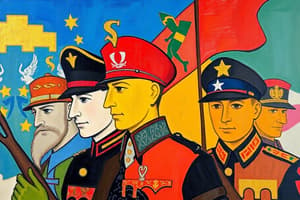Podcast
Questions and Answers
What is a primary characteristic of militarism as a long-term cause of World War I?
What is a primary characteristic of militarism as a long-term cause of World War I?
- Massive military force and preparation for war (correct)
- Creation of a single global empire
- Diplomatic negotiations to resolve conflicts
- Belief in the inevitability of peace
Which two alliances were the major players before World War I?
Which two alliances were the major players before World War I?
- Triple Alliance and Quadruple Pact
- Double Alliance and Allied Powers
- Triple Entente and Triple Alliance (correct)
- Triple Entente and Central Powers
How did imperialism contribute to the causes of World War I?
How did imperialism contribute to the causes of World War I?
- It fostered a spirit of cooperation among nations.
- Empires clashing over territory led to increased tensions. (correct)
- All nations were content with their existing territories.
- It was solely focused on economic competition without any conflict.
What role did nationalism play in the tensions leading to World War I?
What role did nationalism play in the tensions leading to World War I?
What was a consequence of the alliance system during the pre-war period?
What was a consequence of the alliance system during the pre-war period?
Flashcards
Militarism
Militarism
In the early 20th century, this involved countries accumulating vast armies and weapons, preparing for war, and believing that showing military strength would prevent conflict.
Alliances
Alliances
Before WWI, countries formed alliances to protect each other against threats. The main alliances were the Triple Entente (France, Britain, and Russia) and the Triple Alliance (Germany, Austria-Hungary, and Italy).
Imperialism
Imperialism
Countries wanted to control more land and resources. This led to competition and conflict between empires, especially in Europe and Africa.
Nationalism
Nationalism
Signup and view all the flashcards
Bosnian Dispute
Bosnian Dispute
Signup and view all the flashcards
Study Notes
Long Term Causes of WWI
- Militarism: Massive military buildup, preparation for war, and a belief in deterrence through military strength. Arms races fueled competition.
- Alliances: Countries formed alliances (e.g., Triple Entente, Triple Alliance) where an attack on one member would bring others into the conflict.
- Imperialism: Competition for colonies and overseas territories led to conflict and tension. Strong empires sought to expand.
- Nationalism: Strong sense of national pride and identity. Countries and groups desired self-determination and control over territories.
Short Term Causes of WWI
- Conflict over Territory: Disputes between empires over territory fueled conflict.
- Cultural Identity Issues: Disputes & nationalist conflicts within empires, like the conflict between Austria-Hungary and Serbia over Bosnia.
- Serbia's Claim: Serbian desire to control Bosnia due to shared history and culture.
- Specific Political & Territorial Conflicts: The political and territorial struggles between involved countries contributed to the eventual outbreak of war.
Studying That Suits You
Use AI to generate personalized quizzes and flashcards to suit your learning preferences.



